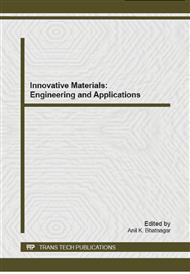p.132
p.137
p.143
p.149
p.155
p.163
p.169
p.173
p.181
First-Principle Study on Half-Metallic Ferromagnetism and Structural Stability of C-Doped Alkaline-Earth Chalcogenides under Pressure
Abstract:
Three half-metallic ferromagnets with NaCl structure, X4CS3 (X = Mg, Ca and Sr) are investigated by the first principle calculations based on the density functional theory in thegeneralized gradient approximation. Non-spin and spin polarized calculations are done to obtain the lattice constants, the equilibrium cell volumes, the stable energies and the magnetic moments of X4CS3, and band structure and density of states for X4CS3 at high pressure are calculated. From the calculations it has been found that X4CS3 is stable in the FM state. The corresponding lattice constants and the equilibrium cell volumes in FM are greater than that in NM. The magnetic moment of X4CS3 decrease as pressure increases, and a second order magnetic phase transition of Sr4CS3 from FM to NM state at pressure of 140GPa, but a second order magnetic phase transitions of Mg4CS3 and Ca4CS3 have not been found. According to the band and the density of states, as the pressure increases the half-metallic nature of X4CS3 destroyed.
Info:
Periodical:
Pages:
155-162
DOI:
Citation:
Online since:
October 2014
Keywords:
Price:
Сopyright:
© 2014 Trans Tech Publications Ltd. All Rights Reserved
Share:
Citation:


